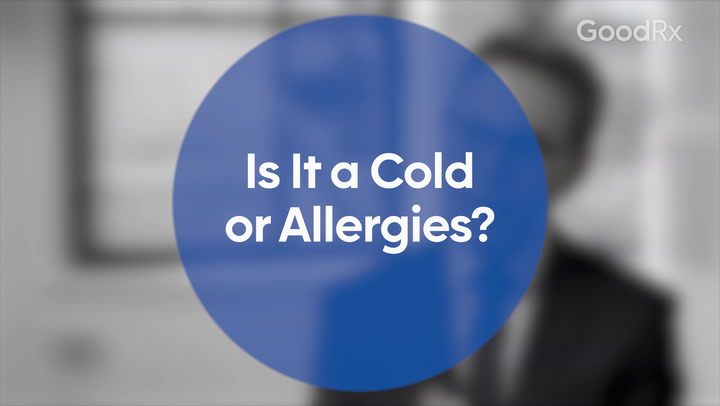
7 Ways to Prevent a Cold When You Feel It Coming
Key takeaways:
Colds are caused by viruses that can survive for hours on surfaces like doorknobs and countertops. This is what makes colds so contagious and hard to avoid.
Getting plenty of sleep, reducing stress, and eating a healthy diet can help you build a strong immune system to fight off cold viruses.
If you do catch a cold, the symptoms aren’t usually severe.
Over-the-counter (OTC) remedies can help ease symptoms while you recover.
Table of contents
Catching a cold is unavoidable for most people. While cold symptoms are usually mild and short-lived, the sneezing, runny nose, and sore throat can last up to 2 weeks. These symptoms tend to resolve on their own, but they can be annoying, and most people want to avoid them.
Fortunately, there are things you can do to reduce your risk of getting a cold.
How can you stop a cold before it starts?
The best way to completely stop a cold before it starts is to avoid people who have a cold. But this can be hard. This is because you can spread a cold virus before you develop symptoms. Not only that, more than 200 different viruses cause the common cold. So, dodging them is hard.
Search and compare options
What can you do once you feel the scratchy throat and runny nose coming on? Let’s take a look at how the research supports seven common cold remedies.
1. Reduce stress
Research shows that stress can reduce your immune response. A weakened immune system can make you more susceptible to many different infections.
In one study, researchers found that people who reported higher levels of psychological stress had higher rates of infection when exposed to a cold virus. The greater the reported stress level, the higher the rates of infection.
2. Try zinc
Zinc is an essential mineral found in the foods we eat. Zinc is also marketed as a supplement to help ward off colds. There’s evidence that zinc can reduce the severity and duration of a cold. But in order to reap this benefit, you need to begin taking zinc within 24 hours of first noticing cold symptoms.
You may start to feel better about a day sooner, on average. Unfortunately, there’s no data to show that zinc can prevent you from catching a cold in the first place. It’s best to stick to zinc lozenges or supplements you take by mouth. Zinc nasal sprays have been linked to a loss of smell, so you may want to avoid those.
3. Take vitamin D if your levels are low
Vitamin D supplements won’t prevent you from getting a cold if you have normal vitamin D levels. But many people have lower-than-normal vitamin D levels — especially in the wintertime. Since vitamin D plays a key role in keeping your immune system healthy, it makes sense to ensure you maintain healthy vitamin D levels. In fact, there’s evidence that people with low vitamin D who take vitamin D supplements get fewer colds.
How long does a cold last? Here’s what to expect from the four stages of the common cold.
Overwhelmed by choices at the pharmacy? Read our pharmacist tips on how to choose the best cold and flu medicine for your symptoms.
“Get plenty of rest,” they say. While this may sound like sensible advice, it’s not always easy in practice. Review these tips for getting good-quality rest when you’re sick with a cold.
4. Drink lots of fluids
There’s no scientific evidence that drinking lots of fluids helps ward off or treat a cold. That said, it’s conventional wisdom to replace any fluids you lose, especially if you have diarrhea or vomiting.
But don’t overdo it. Over-hydrating with pure water can lead to dangerous complications, like low sodium levels in your blood (hyponatremia), also called water intoxication.
5. Eat nutritious foods
The food you eat provides the building blocks for a healthy body. Building your immune system requires getting adequate nutrition all year-round — not just when you’re exposed to a cold virus. Prioritizing nutritious foods every day means you’re ready to fight off a cold virus when it inevitably hits.
Your food choices also matter when you start noticing cold symptoms. Some foods, like garlic, ginger, and honey, can improve your symptoms. Meanwhile, other foods high in refined sugar might make them worse.
6. Rest up
Getting good sleep regularly may help fend off colds. Some evidence suggests that people who sleep fewer than 6 hours a night catch colds more easily than those who sleep more than 7 hours. Another study showed that people who slept fewer than 7 hours a night were at least three times more likely to develop cold symptoms than those who slept more than 8 hours a night.
It’s best to strive for at least 7 to 9 hours of sleep each night for the best health. And this may help keep cold symptoms at bay.
7. Wash your hands
The CDC estimates that 1 in 5 respiratory illnesses could be prevented by routine handwashing with soap and water. When out in public spaces, you may want to be more mindful of keeping your hands clean. If you’re unable to wash your hands with soap and water, you can use a hand sanitizer with at least 60% alcohol after touching any surface.
While this may not help your symptoms once they develop, it may help keep you from spreading germs to others.
When should you see a doctor for your cold?
Most colds go away on their own. But sometimes they can turn into something more serious — especially if you have an underlying medical condition. Call a healthcare professional if:
Your symptoms start to get better but then worsen
Your symptoms last 10 or more days
Your fever lasts more than 3 days
You have shortness of breath
You have chest pain or dizziness
You cough up bloody mucus
Frequently asked questions
One reason is that there are more than 200 viruses responsible for the common cold. And rhinovirus, the most common cold virus, may have a unique strategy to infect as many people as possible, as many times as possible. It essentially floods the space with multiple versions of itself, increasing the chances of breaking through individuals’ immune systems.
But there are other reasons too. Some people are more prone to catching colds than others. This could depend on several things including:
Individual genetics
Job factors
Household risks
Stress levels
Sleep quality
Diet
Smoking history
Hand hygiene habits
No, OTC cold medications won’t prevent a cold or make it shorter. But they can make your cold symptoms easier to tolerate while your body recovers from the infection. These include medications like:
Pain relievers and fever reducers (like acetaminophen and ibuprofen)
Decongestants (like pseudoephedrine)
Nasal sprays (like fluticasone)
Cough medications (like guaifenesin and dextromethorphan)
Always take OTC medications as directed on the label. And talk to your primary care provider first if you’re taking prescription medications or have any medical conditions.
Even though many people reach for vitamin C supplements when they start to feel sick, and many OTC cold remedies include vitamin C, there’s no solid evidence that vitamin C supplements help prevent or treat a cold.
While vitamin C does play a role in immune system function, most people get more than enough vitamin C from their diets. Boosting vitamin C levels beyond what’s considered “normal” doesn’t provide any additional benefit.
The bottom line
You can catch a cold anytime of the year, but steering clear of crowded places and people who are sick may reduce your chances. Getting plenty of rest, eating healthy, and reducing stress may also reduce your risk of getting sick if you’re exposed to a cold. Once you feel the symptoms coming on, some supplements and OTC medications may help shorten the time you are sick. They can also reduce the symptoms and help you feel better.
The good news is that the common cold usually doesn’t cause serious illness in most people and goes away on its own. But if your symptoms are worsening and not getting any better, let your healthcare team know.
Why trust our experts?


References
Centers for Disease Control and Prevention. (2024). About handwashing.
Centers for Disease Control and Prevention. (2024). Hand sanitizer guidelines and recommendations.
Cohen, S. (1991). Stress and infectious disease in humans. Psychological Bulletin.
Cohen, S., et al. (1991). Psychological stress and susceptibility to the common cold. The New England Journal of Medicine.
Cohen, S., et al. (2009). Sleep habits and susceptibility to the common cold. Archives of Internal Medicine.
Davidson, T. M., et al. (2010). The Bradford Hill criteria and zinc-induced anosmia: A causality analysis. Archives of Otolaryngology — Head and Neck Surgery.
Goya, S. (2024). Genomic epidemiology and evolution of rhinovirus in western Washington state, 2021–2022. The Journal of Infectious Diseases.
Guppy, M. P. B., et al. (2004). “Drink plenty of fluids”: A systematic review of evidence for this recommendation in acute respiratory infections. The BMJ.
Guppy, M. P. B., et al. (2011). Advising patients to increase fluid intake for treating acute respiratory infections. Cochrane Database of Systematic Reviews.
Hemilä, H., et al. (2017). Zinc acetate lozenges may improve the recovery rate of common cold patients: An individual patient data meta-analysis. Open Forum Infectious Diseases.
Institute for Quality and Efficiency in Health Care. (2023). Common colds: Overview. InformedHealth.
Martineau, A. R., et al. (2017). Vitamin D supplementation to prevent acute respiratory tract infections: Systematic review and meta-analysis of individual participant data. The BMJ.
MedlinePlus. (2022). Common cold.
National Institutes of Health. (2022). Zinc: Fact sheet for health professionals.
Prather, A. A., et al. (2015). Behaviorally assessed sleep and susceptibility to the common cold. Sleep.
Thirumdas, R., et al. (2021). Role of food nutrients and supplementation in fighting against viral infections and boosting immunity: A review. Trends in Food Science and Technology.
Wang, M. X., et al. (2020). Zinc supplementation reduces common cold duration among healthy adults: A systematic review of randomized controlled trials with micronutrients supplementation. The American Journal of Tropical Medicine and Hygiene.

























